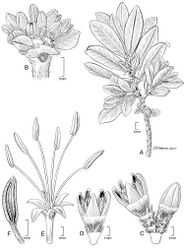Coprosma meyeri
| Notice: | This page is derived from the original publication listed below, whose author(s) should always be credited. Further contributors may edit and improve the content of this page and, consequently, need to be credited as well (see page history). Any assessment of factual correctness requires a careful review of the original article as well as of subsequent contributions.
If you are uncertain whether your planned contribution is correct or not, we suggest that you use the associated discussion page instead of editing the page directly. This page should be cited as follows (rationale):
Citation formats to copy and paste
BibTeX: @article{Wagner2011PhytoKeys4, RIS/ Endnote: TY - JOUR Wikipedia/ Citizendium: <ref name="Wagner2011PhytoKeys4">{{Citation See also the citation download page at the journal. |
Ordo: Gentianales
Familia: Rubiaceae
Genus: Coprosma
Name
Coprosma meyeri W. L. Wagner & Lorence sp. nov. – Wikispecies link – IPNI link – Pensoft Profile
Latin
Foliis coriaceis 4–7.2 longis × 1.2–2 cm latis, oblanceolatis, laminis cum secondaria et altiori obscura venatione, centrali costa solum conspicua, petiolis 0–0.1 cm, stipulis ca. 3–8 mm longis.
Type
Marquesas Islands: Hiva Oa:Feani area, on Hanamenu trail at summit crest above Vaiumete et Vaiumioi, 1090 m, [9°47.93"S, 139°4.75"W], 30 January 2003, S. Perlman 18337 (Holotype: PTBG!; Isotypes: BISH!, P!, PAP!, US!).
Description
Shrubs 2–3 m tall; young stems sparsely villous. Leaves opposite, thick-coriaceous, blades 4–7.2 cm × 1.2–2 cm, oblanceolate, only midvein evident, both surfaces glabrous, domatia absent, apex acuminate to acute, base cuneate; petioles ca. 0.1 cm long; stipules 2.5–3 mm long, connate 4/5 of length, both surfaces glabrous, margin dentate with a few conspicuous colleters and ciliate, the colleters usually with a tuft of hairs. Inflorescences axillary, apparently trichotomously branched, with very short internodes, with 6(–12) flowers, these 5–6-merous, subsessile. Flowers: male flowers with campanulate calyx ca. 2 mm long, the tube 1.5 mm long, the lobes triangular, 0.5 mm long; corolla narrowly funnelform, 5.4–5.7 mm, the tube 3.3 mm long, the lobes 2.1–2.4 mm long, the anthers 2.5–3.1 mm long, filaments to 11 mm long; female flowers unknown. Fruits and pyrenes unknown.
Distribution
Coprosma meyeri is known only from the type locality at ca. 1090–1113 m elevation in the Feani area along the trail to Hanamenu on the summit crest of Hiva Oa, Marquesas Islands.
Ecology
This new species occurs in cloud-shrouded low wet forest and shrubland dominated by Metrosideros and Weimannia, with species of Alsophila, Alstonia, Ascarina, Blechnum, Cheirodendron, Crossostylis, Cyrtandra, Dicranopteris, Freycinetia, Myrsine, Oparanthus, Psychotria, Reynoldsia, and Trimenia.
Etymology
The specific epithet honors Dr. Jean-Yves Meyer, conservation biologist at the Délégation à la Recherche, Polynésie française, in recognition of his untiring efforts to explore and conserve the biodiversity of French Polynesia.
Conservation status
Coprosma meyeri is extremely rare, with less than five plants known from a single locality. Following the criteria and categories of IUCN (2001) it is assigned a preliminary status of Critically Endangered (CR): B2a, B2b (i-iii); D: B2: total area of occupancy less than 10 km2 (ca. 5 km2); B2a, a single population known; b (i–iii), habitat continuing decline inferred; D, population estimated to number fewer than 250 individuals. The suitable habitat for on Hiva Oa (c. 315 km2) is indicated as an endangered environment threatened by human activities (deforestation and fire), feral animals, and invasive plants, reducing the extent of the forest. Its narrow distribution, disturbance from feral pigs and trail clearing, and invasion by alien plant species such as Syzygium cumini (L.) Skeels and Psidium cattleianum Sabine put it at risk of extinction.
Specimen examined
Marquesas Islands: Hiva Oa:Feani area, trail to Hanamenu, along summit crest, 1113 m, [9°48' 3" S, 139°4'682" W], 1 Aug 2005, S. Perlman 19763 (BISH, P, PAP, PTBG, US).
Original Description
- Wagner, W; Lorence, D; 2011: Revision of Coprosma (Rubiaceae, tribe Anthospermeae) in the Marquesas Islands PhytoKeys, 4: 109-124. doi
Images
|

